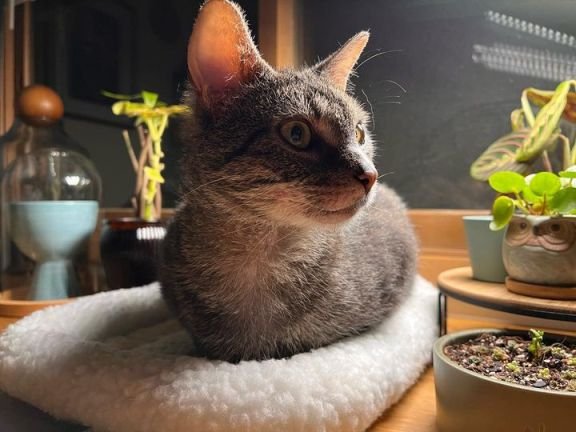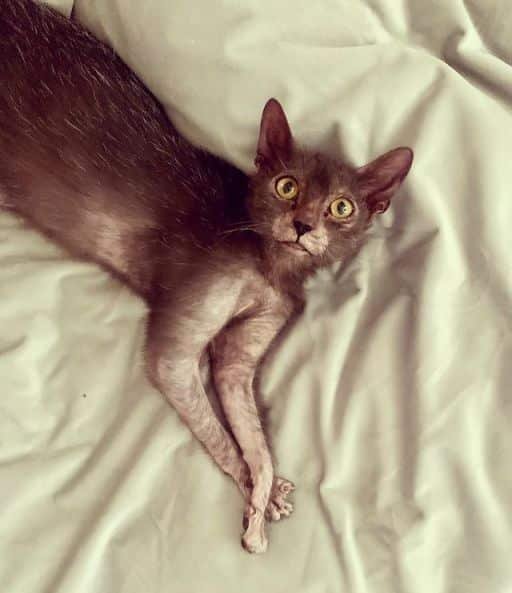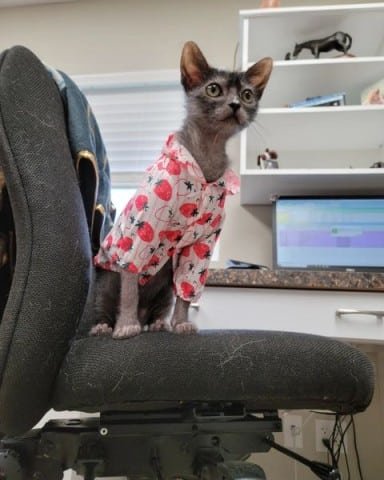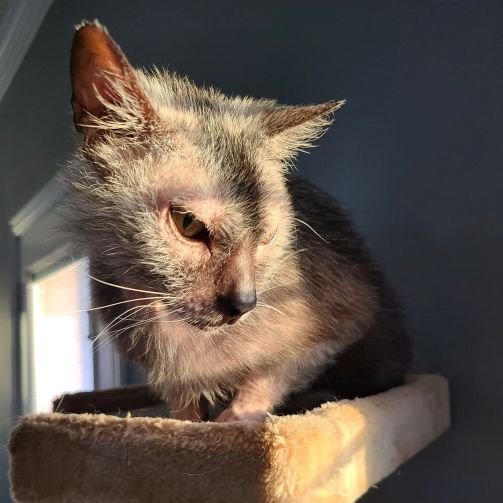Werewolves are probably one of the most famous mythical creatures, enticing our imagination for several centuries. They are usually connected to wolves and dogs, but did you know that there are werewolf cats – Lykoi cats?
Unlike werewolves, Lykoi cats are real, and they aren’t similar to werewolves due to some supernatural characteristics. Their unusual appearance is actually the reason behind this comparison, so if this has intrigued you, keep reading to learn more!
Lykoi Cat Characteristics
Appearance
| Fur color | Black fur with silvery streaks |
| Fur pattern | Roan (main fur color thickly interspersed with hairs of another color) |
| Fur length | Short |
| Eye color & shape | Large, round, gold or green eyes |
| Length | Males 12”-15” Females 9”-12” |
| Weight | Males 6-12 lbs Females 4-8 lbs |
| Expected lifespan | 12-15 years |
Personality
| Temperament | Easygoing, friendly, playful, affectionate, energetic, loving, intelligent, curious, and sweet. |
| Kids and other pets | Friendly towards children and cat-friendly pets. |
| Sociable and cuddly | They can be shy and aloof when surrounded by strangers, but once they get to know you, Lykoi cats become cuddly and affectionate. |
Requirements & Traits
| Feeding | Meat-based wet and dry cat food rich in animal protein and moderate in animal fat. Kittens should eat more often than adult Lykois. |
| Grooming | Fur brushing twice a week, bathing once a month, nail trimming, teeth brushing, ear cleaning |
| Shedding | High |
| Hypoallergenic | No |
History and Origins

With such an unusual name and appearance, you might think that Lykoi cats belong to an ancient cat breed. In that case, you are wrong. Lykoi cats are actually one of the newest and youngest breeds.
As with other cat breeds with unique physical traits, Lykoi’s unusual appearance is a product of a spontaneous gene mutation. The first two cats carrying this mutation were discovered in Virginia in 2010 by Patti Thomas.
The next year, another pair of these cats was discovered by Johnny and Brittany Gobble in Tennessee. These four cats were a foundation for a new breed that was named Lykoi (after the Greek word Lykos, which means a wolf)
For these cats to be recognized as a new breed, Johny Gobble tried to prove that their unusual appearance wasn’t a result of some disease. To achieve that, he bred two Lykoi cats that weren’t related in an attempt to produce the first intentionally bred Lykoi.
His attempt was successful, and over time, he determined that this gene mutation was recessive. Since the mother of one of the first Lykoi litters was a black domestic shorthair cat, breeders continued to outcross Lykoi cats with black shorthairs in order to avoid too much inbreeding.
Lykoi cats are still being born naturally among the feral cat population, and breeders often include them in the official Lykoi breeding program. This further helps breeders to expand the Lykoi breed’s gene pool.
Recognition
In 2012, Lykoi cats gained “Registration Only” status from The International Cat Association (TICA) registry. In 2017, Lykoi cats were awarded championship status by TICA.
When it comes to Cat Fanciers’ Association, Lykoi cats were recognized and accepted to compete as “Provisional.” They should be getting their championship status in 2023/2024.
Lykoi Cat Personality
When you first look at a Lykoi cat, you might think it is wild and untamed, or at least very skittish. However, first impressions can often be misleading, and such is the case with Lykoi cats.
Despite their weird appearance, Lykoi cats are actually quite sweet, loving, affectionate, and gentle animals. They are extremely devoted to and enamored by their owners, just like most other cat breeds!
Apart from that, Lykoi cats are intelligent, curious, playful, energetic, and active. They like to play and explore their surroundings, and sometimes, they even wander off when too consumed by their adventures.
Lykoi cats are friendly towards children and other pets, given that all sides are properly socialized. However, one thing to consider is that Lykoi cats prefer quiet and peaceful households, despite their energetic nature. This means your Lykoi cat will get along much better with your children if they are already teenagers than with toddlers or preschoolers.
When it comes to meeting strangers, your Lykoi cat will probably be a bit shy and cautious, but that will change once it gets to know the person.
Lykoi Cat Appearance

Lykoi cats aren’t constantly compared to werewolves for no reason, as their appearance is quite unique in the domestic cat world. Their unusual fur is mainly responsible for their appearance, so let’s learn more about it:
Fur
Many cat breeds carry gene mutations that make their fur special, and Lykoi cats are definitely such a breed. Oftentimes, their fur is compared to that of opossums. Lykoi cats are born without an undercoat, so their fur can look a bit sparse. Some Lykoi cats are even completely hairless, while others have bald patches or parts of the body. Most commonly, their nose and face area is bald, which makes these cats look like werewolves.
The Life Cycle of Lykoi’s Fur
However, when looking at a newborn Lykoi kitten, you would never know it is different from “normal” kittens. Lykoi kittens are born with normal hair, but they start losing it when they are approximately two weeks old. Some kittens even become completely bald.
Later on, their fur grows back again, but this time, it is roan, coarse-looking, without an undercoat, and sparse. For a cat to be considered Lykoi, it needs to possess all of these characteristics. While some Lykoi cats are almost hairless and similar to Sphynx cats, Lykoi cats with more fur are actually more prized.
One Lykoi cat can go through several such phases of losing their fur and then regrowing it back. When they regrow their fur, Lykoi cats can end up with less or more sparse furs, and they can even change their fur coloring a bit. Let’s be honest; this is cool and a bit frightening at the same time!
The most common fur color among Lykoi cats is black because they originated from a black domestic shorthair mother, and they are often outcrossed to black domestic shorthairs. There are some Lykoi cats that are more brownish or even white.
The roan fur pattern is used to describe when the base fur color is “sprinkled” with numerous streaks of another color. This fur pattern is often observed in horses, antelopes, cattle, and dogs. Lykoi fur is short, and it has a coarse-like appearance. However, don’t let the appearance fool you; Lykoi’s furs are actually soft and silky, perfect for petting.
Eyes
Lykoi cats have large, round, and expressive eyes. Most Lykoi cats have amber or gold eyes, but there are also some with green eyes.
Size
Lykoi cats are small- to medium-sized and slender animals. The males are noticeably larger than the females. A male Lykoi cat usually weighs between 6 and 12 pounds, and his body length is approximately 12-15 inches.
Female Lykoi cats, on the other hand, typically weigh between 4 and 8 pounds, while their body length is, on average, between 9 and 12 inches.
Other Body Characteristics
Lykoi cats have slender, oblong, and elegant bodies with fine boning and strong muscles. Their legs are slender, long, and fine-boned, proportionate to the rest of the body. The back legs are stronger and longer than the front legs. The paws are oval and dainty.
The tail is also long and proportionate to the rest of the body. It is slender and flexible, tapering and ending in a pointy tip, which gives it a whip-like appearance.
The head is wedge-shaped and narrow, with rounded whisker pads and muzzle, high cheekbones, and a strong chin. The neck is long and slender. Lykoi cat’s ears are large and widely set apart. They start wide at the base and end up with somewhat rounded tips.
Daily Life With Lykoi Cat
Lykoi cats can be great pets, but they are a bit more demanding than some other breeds. This means that you should think twice and think well about whether you can provide everything that one Lykoi cat might need.

Of course, this doesn’t mean that you shouldn’t get a Lykoi cat at all, but if you can’t fulfill these requirements, you should look for another cat breed that will be easier to care for. Here is what you need to do to keep your Lykoi cat happy and healthy:
Feeding
This aspect of caring for your Lykoi cat isn’t much different than with other cat breeds. Lykoi cats are obligate carnivores, just like all other cats, which means that they should only eat meat-based foods that are packed with animal protein.
According to some cat experts, every cat needs to get 41 specific and different nutrients from their food in order to stay healthy. These necessary nutrients include proteins, fats, carbohydrates, iron, zinc, magnesium, calcium, chloride, and sodium.
Of course, the needed proportion and amount of these nutrients may vary depending on the cat’s age, gender, activity levels, and overall health. This might seem like a lot, especially when you consider that cats should eat only meat, which significantly reduces food diversity.
However, if you choose high-quality commercial cat foods for your Lykoi cat (or any other breed), you can rest assured that your cat is getting all of these nutrients. Also, make sure to get your Lykoi cat both wet and dry cat food. Wet food will keep your cat hydrated (plus, most cats are crazy about it), while dry food is more calorie-packed, and it helps your cat clean its teeth while chewing.
Lykoi kittens and juveniles need to eat more often than adults because they are still growing and need more meals to sustain that growth. This means that you should feed them 3-4 times a day, as opposed to feeding adult Lykois 2-3 times a day.
Less-Known Factors For Determining the Portion Size
For the exact portion size, it’s best if you consult your vet. There are many guides out there on how to determine the optimal portion size, but unless you know how many calories your cat needs daily and how many calories are in one portion of a certain size, consult your vet.
Alternatively, if your new Lykoi cat isn’t your first cat, you probably already know how much food an average medium-sized cat needs. If that’s the case, you can use that as a reference point, at least until you figure out whether you need to feed your Lykoi cat less or more.
There is another thing that not many sources about Lykoi cats will mention, but as an experienced cat owner, I think it is logical. Lykoi cats don’t have dense furs that keep them warm when the temperature is low. As a result, more of their calorie intake goes into body temperature regulation.
This means that your Lykoi cat (or any other cat with spare or no fur) needs to eat a bit more than a same-sized cat that has thick fur. Even if your Lykoi cat is indoors all the time (as it should be), you should still take this into consideration when feeding it.
Grooming
If the previous section seemed like a lot of information to process, wait till I tell you more about Lykoi’s grooming needs! Just kidding, of course; while all these requirements may look like a lot at first glance, they aren’t that complicated or demanding, and when you think about it – they all make sense.
First, you need to brush your Lykoi cat’s fur regularly, at least once or twice a week. Since it is so sparse and silky soft, you might think that not much brushing is needed, but you couldn’t be farther away from the truth. Lykoi cats actually shed a lot, sometimes even more than common domestic shorthairs.
Regular brushing will reduce the shedding or at least prevent all those hairs from ending up on your clothes, furniture, and carpets. It also helps distribute any excess oils from the skin to the fur, which helps keep the skin healthy and clean.
Additional Requirements
However, brushing isn’t enough to keep your Lykoi’s cat skin and fur healthy. You will need to gently bathe your Lykoi cat in lukewarm water once a month. If you decide to use any cosmetic products, such as soaps or shower gels, make sure to use the products that were specifically made for cats.
Under no circumstances should you use your products on the cat because they can damage your cat’s skin and fur. If you don’t know which cat cosmetic products are the best, consulting your vet is the best way to go.
Lykoi cats, just like other hairless cats, are prone to oil buildup on their skin, especially on the paws and ears. Use a damp cotton cloth or paper towel to clean these areas.
Nail trimming is also important for indoor cats because it prevents them from scratching you and your furniture. If you start trimming your Lykoi cat’s nails while it is still a kitten, you won’t have any problem doing it when your kitten grows up.
The same goes for dental hygiene. It is important for your cat’s dental health that you brush its teeth every day or as often as possible. If you make this a routine for your cat while it is still a kitten, regular teeth brushing will be easy even when your Lykoi becomes a fully adult cat.
Activity
Lykoi cats are among the most active breeds, so keeping them entertained can be challenging but not impossible. To make sure your Lykoi cat has enough exercise to stay healthy, fit, and mentally stimulated, there are several things you should do.
First, buy your Lykoi cat plenty of toys. Choose toys that are squeaking or filled with catnip. The toy can also have some “fur” or feathers, which will further entice your Lykoi cat to play with it. If you can find some toys that are interactive or puzzle-like, that would be even better.
Cat climbing and scratching trees are also must-haves for any cat, especially when it’s active and energetic as Lykoi cats. Apart from buying these, you need to make sure that your cat has enough space to run around. If you live in a small apartment, you should consider getting a different cat.
Of course, you should take some of your time every day to play with your Lykoi cat. Letting your Lykoi cat play outside under your supervision would be a great idea if it wasn’t for Lykoi’s sensitivity to the sunlight and cold.
Since their furs are sparse and sometimes nonexistent, Lykoi cats can suffer from sunburns or frostbite if they are exposed to the elements. This is why Lykoi should be an indoor-only cat unless you can somehow protect them from the elements while outside.
Most Common Lykoi Cat Health Issues

Despite being a new breed with a relatively narrow gene pool, Lykoi cats are healthy in general. They usually suffer from some common health conditions that affect all other breeds. Still, their unique genetic makeup can make them more prone to some health issues:
Skin and Coat Issues
At the University of Tennessee, dermatologists examined the Lykoi breed’s skin and hair samples in an attempt to find some skin abnormalities. They found out that some hair follicles of Lykoi cats lack the necessary components needed to create hair.
Other follicles that didn’t lack these components suffered from a lack of balance between the components, which is crucial for maintaining the hair. This is why Lykoi cats have such sparse coats and why they can lose that coat and regrow it several times during their lifetime.
As a result, Lykoi cats are more prone to skin and coat issues, such as mites, oil buildup, dry skin, infections, etc. If you notice a rash, inflammation, redness, or excessive itching on your Lykoi cat, you should take it to the vet.
The vet will be able to determine the cause of the problem and prescribe the appropriate treatment. They will also help you avoid similar problems in the future with some care and maintenance tips.
Dental Problems
Many cats suffer from dental problems, and Lykoi cats are no different. There are actually many various dental problems that can affect your Lykoi cat, but they are most often caused by bad hygiene.
When your cat chews food, a bacteria buildup called plaque appears on its teeth, which can cause cavities and other dental issues. Additionally, some food can get stuck between the tooth and gums, which then becomes a breeding ground for bacteria, and eventually leads to inflammation and infection.
These issues can lead to tooth or even bone loss, and the infection can even spread to the rest of the body, which can be fatal. So, if your cat has bad breath, inflamed, red, bleeding, or swollen gums, or if it has trouble chewing its food, it might be suffering from dental issues.
Don’t wait till the issue becomes more severe; take your cat to the vet. The vet will be able to assess the situation and come up with the best treatment plan.
Respiratory Issues
Apart from brachiocephalic cats that suffer from narrow airways and breathing difficulties, other cat breeds, including the Lykoi cats, can suffer from various other respiratory issues.
Some Lykoi cats can develop asthma or allergies. Both of these conditions are usually chronic and can prevent your Lykoi cat from breathing properly. If you notice your Lykoi cat is coughing, sneezing, wheezing, or breathing with difficulty, it might be suffering from asthma, allergies, or some other respiratory condition.
Take it to the vet to determine what is causing the issues and how to make them go away. The vet will come with an appropriate treatment plan that should make your cat’s life much easier.
Ear Infections
Lykoi cats have large ears that can become infected due to earwax and other debris buildup, ear mites, allergies, or due to the presence of various bacterial ad fungal pathogens.
If you notice your Lykoi cat has some unusual discharge coming from its ears, or if there are other symptoms such as redness, swelling, and inflammation of the ears, this is a common sign of an ear infection. Some other symptoms are excessive scratching, lethargy, loss of balance, and foul odor coming from the affected ear(s).
If you notice any of these symptoms, make sure to take your Lykoi cat to the vet, where it will receive a diagnosis and treatment.
Hyperthyroidism
This is a condition relatively common not only among Lykoi cats but also among many other cat breeds. As its name suggests, this condition is caused by the excess secretion of thyroid hormones. This excess secretion leads to numerous health problems.
Some of the most common symptoms of hyperthyroidism include weight loss, hyperactivity, restlessness, diarrhea, vomiting, increased urination and thirst, a greasy coat, and increased shedding.
If you notice any of these symptoms, you should take your Lykoi cat to the vet. The vet will probably conduct some blood tests that will determine the amount of thyroid hormone in your cat’s bloodstream. Then, they will prescribe the appropriate treatment that will bring your cat’s hormones back to normal.
Lykoi Cat Name Suggestions
Since Lykoi cats have that unique werewolf-like appearance, their owners usually choose names that reflect that. With that in mind, some of the best choices for Lykoi cat names are:
- Wolf (this one is obvious)
- Fang
- Remus
- Luna
- Lycan
- Lupin
- Moon
- Koda
- Shadow
- Ghost
- Night
- Skoll
- Fenrir
Buying or Adopting Lykoi Cat
Lykoi cats are extremely rare, with their population being estimated to 100-200 cats total. It is easy to see that finding one in a shelter is close to impossible. In some rare cases, you can stumble upon a Lykoi kitten that was born to a feral mother. Alternatively, you can look for Lykoi-related groups or organizations. Maybe you find someone who got a Lykoi cat but wants to give it away or resell it.
Still, the best option for finding a Lykoi cat is to find a Lykoi breeder and buy a kitten from them. This will still be a challenge, though. There are not many Lykoi breeders out there, but it is still more probable than the previous two options.
The price for Lykoi cats ranges from $1500 to $2500 and even more, depending on the breeder, the cat’s age, gender, and physical traits.
Frequently Asked Questions
Yes, Lykoi cats are good pets, especially for owners that like more active and playful cats.
Their sparse, coarse-looking, and roan furs make Lykoi look like little werewolves.
Even though they have a bit more complex care requirements, I wouldn’t call them high maintenance. Once you establish a routine, caring for your Lykoi cat is quite simple and easy, you just need to be consistent.
Yes, with only 100-200 of them, you can safely consider them extremely rare.
The question isn’t whether they can go outside but whether they should. If you can protect your Lykoi cat from UV sun rays, rain, snow, and cold temperatures, then you can take it outside. If that’s not the case, keep your Lykoi cat inside.
Lykoi Cat Alternatives
If you have a specific taste in cats and you like how Lykoi cats look but can’t find one, there are some great alternatives. The best alternatives for Lykoi cats are certainly the cats that have similar specific furs or no furs at all.
With that in mind, the best alternatives for Lykoi cats are Cornish Rex, Devon Rex, Sphynx, Peterbald, and Donskoy cats. All of these breeds have either sparse or no fur, and they even share a similar slender physique with Lykoi cats.
To me, Lykoi cats have a somewhat elvish appearance with their slender bodies, small heads, and large eyes and ears. Oriental Shorthair is another breed that fits this description, so consider getting one of them instead of a Lykoi cat.
Lykoi Cat Fun Facts
- Another interesting feature of Lykoi cats is their skin. Since it isn’t fully covered with hair, some Lykoi cats have pink skin that goes browner when exposed to sunlight. Basically, Lykoi cats can get tanned. However, keep in mind that their skin can be damaged by UV rays. Don’t expose your Lykoi cat to sunlight unless necessary.
- Lykoi cats love their toys! They can even become extremely possessive over their toys and will be reluctant to share them.
- Although people often compare them to Sphynx or Devon Rex cats, Lykoi cats aren’t genetically related to any of these breeds, and their gene mutation is unique.
Summary
Lykoi cats aren’t for everyone: if you want your cat to look elegant and gracious, you should find another cat. However, if you know how to appreciate the unusual and hidden beauty, consider getting yourself a Lykoi cat.
In a way, Lykoi cats are like roses with lots of thorns: they may look coarse at first, but they are beautiful animals full of love. Get yourself a Lykoi cat, and you will have a devoted, affectionate, sweet, and intelligent pet!
Featured Image Credit: loki.the.lykoi
